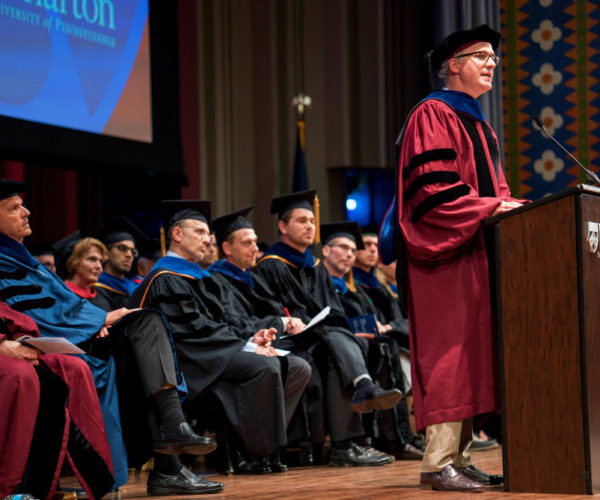What’s a convocation anyway? Literally, it’s a “calling together.” Convocation can mean different things at different institutions. Some colleges and universities use the word to refer to the entirety of their alumni as a representative body. Others call their graduation events part of “convocation” rather than “commencement.”
At Penn, Convocation is a formal ceremony to officially welcome a new class for the first time. It’s a Penn tradition that dates back to 1910 (and perhaps, on an informal basis, even earlier). Wharton hosts its own Convocation for MBA students to officially mark the beginning of their academic journey and welcome them into the intellectual community.
You can think of it as a bookend to Commencement — the class walks together for the first time through the doors of Irvine Auditorium and in two years, they’ll process out of the Palestra as Wharton graduates.
A Warm Welcome and Words of Advice

Each year at Convocation, Wharton rolls out the welcome mat for its newest class of MBA students. In addition to hearing from the Dean, the Vice Dean, and the Deputy Vice Dean, the incoming class receives a special welcome and some words of wisdom from a faculty speaker.
This August, the Class of 2021 will hear from Angela Duckworth, G’03, GR’06, Christopher H. Browne Distinguished Professor of Psychology and faculty co-director of Wharton People Analytics and the Penn-Wharton Behavior Change for Good Initiative.
Here’s a look at some of the best advice her predecessors have shared in years past:
Prof. Jonah Berger to the Class of 2014

“Set a goal and write it down. When we’re not sure of our own goals, it’s really easy to look around and follow other people’s goals. And if you want to follow the herd, that’s fine. But, if not, think about what your own goal is. Think about what you want. This is your opportunity to do something different, something big, something life-changing.”
Prof. Joseph Simmons to the Class of 2015

“(Alain de Botton) recently said, ‘Anyone who isn’t embarrassed of who they were last year probably isn’t learning enough.’ I promise you that you will look back on yourself two years from today, and you will probably feel at least a little bit embarrassed.”
Prof. Michael Sinkinson to the Class of 2016

“You are going to be very busy these next two years. Despite all the demands on your time, my recommendation is to leave yourself some time here and there to reflect on which direction you want to go in after you leave this program. Many of you will have a ‘moment of realization’ about where you want to take your life. My point is that considering where you are in your life, you should reflect and consider opportunities you never considered before.”
Prof. Eric Bradlow to the Class of 2017

Marketing Professor and Chair Eric Bradlow used his time in the Convocation spotlight a bit differently — rather than sharing words of wisdom for the new MBAs, he set out to start a movement.
“If you follow me on Facebook or Twitter, you will see that whenever I post something professional, or post something about one of our alums, I always use the phrase, #WhartonProud. I am here today to tell you that the most important thing you can do from this point forward is to be #WhartonProud.”
Prof. Cade Massey to the Class of 2018

“This is my surprising suggestion for your time at Wharton: That you learn how much you don’t know. That you come to appreciate the value of Epstein’s intellectual posture that – even if you might know more than others in the room – there is still plenty you don’t know. Focus on learning rather than knowing. Certainty inhibits the desire to learn.”
Prof. Asuka Nakahara to the Class of 2019

“Hard work also shifts the odds of success in your favor. In a world of osmosis, people see both effort and results. They will watch what you do, not what you say. If what you do is impressive, you will earn their respect and trust, further building your self-confidence and your reputation. Speaking of reputation, older executives invariably talk about its importance. ‘My reputation is all I have’ – is what many say. If it is so valuable, maybe it’s worth thinking about how one builds a worthy and deserved reputation.”
Emil Pitkin to the Class of 2020

“I urge you now, that when the time comes to reflect, take account of what you’ve earned. When it comes time to give charity, make your voice and influence known. To call forth the resources at your disposal. To create staggeringly successful businesses for the benefit of employees, shareholders, fellow citizens. […] When the time comes and you occupy the heights of wealth or prestige or influence, spare a thought for those who will at that time in the future find themselves in the seats that you occupy today. Lend them your hand.”
— Colleen Donnelly
Posted: August 6, 2018


















